单元语法小专题.doc
单元语法小专题(Grammar Focus)
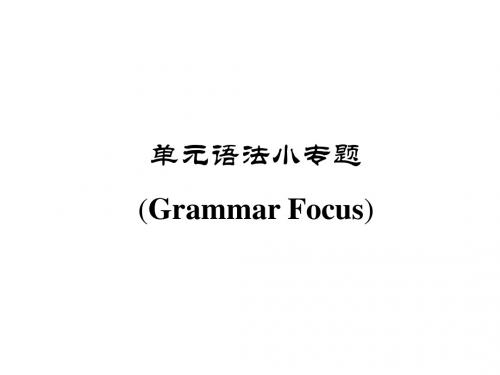
8.They go to the science club three times a week.(对画线部分提问)
How________ often do ________ they go to the science club? ________ 9.Frank usually listens to music in the evening.(对画线部分提问) What does do ________ ________ Frank usually ________ in the evening? 10.We have English lessons on Monday,Tuesday,Thursday
often,意为“多久一次”。如: —How often does Lisa go to the movies?丽萨多久看一次电影? —Never.从不。 6.频率副词或短语常与一般现在时连用。如:
I never eat meat.我从不吃肉。
Jim usually does his homework in the evening.吉姆通常晚上做作业。
Ⅱ.按要求完成下列句子,每空一词。
6.She washes clothes every Sunday.(改为否定句)
doesn't________ wash She ________ clothes every Sunday.
7.Jack usually does his homework at school.(改为一般疑问句) Does Jack ________ usually do ________ ________ his homework at school?
Sally doesn't often watch TV at the weekend.沙丽周末不常看电视。
新人教版九年级英语 Unit 10 单元语法小专题
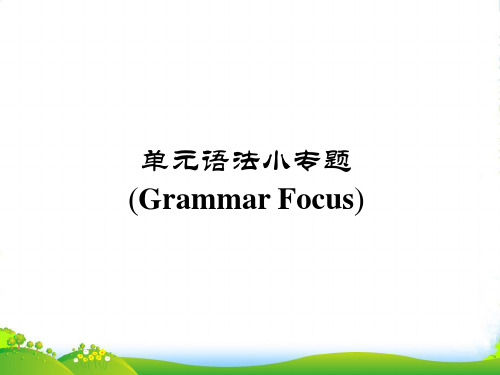
Ⅱ. 用suppose的适当形式填空。
6. I __s_u_p_p_o_se_ she is not yet thirty years old. 7. You were s_u_p_p_o_s_e_d_ to be here at 2:00. I have been waiting for you for almost an hour! 8. I __s_u_p_p_o_se_ that my father will be back in half an hour. 9. You are not _s_u_p_p_o_s_e_d to trouble her again. 10. —Is it going to rain this aft问) _____W__h_a_t _a_re_____ students supposed to ____d_o___ when classes begin in China?
2. 在口语中,常用否定结构“be not supposed to do sth.”, 意思是“不允许做某事;不应该做某事”,相当于shouldn't 。如: You are not supposed to smoke on the bus.(=You shouldn't smoke on the bus.)你不应该在公共汽车上吸烟。 We are not supposed to play football in the street.我们不应该 在大街上踢足球。 3. be supposed to have done sth.意为“本应该做某事而没有做” 。如: You are supposed to have handed in your homework.你本应该 已经交了作业。
4. supposed+that从句,当变为否定句时,否定词应 该前移。类似的词还有think,believe等。如: I don't suppose he will tell you about it.我认为 他不会告诉你这 件事。 I don't think he will come.我想他不会来了。 5. suppose还有“猜想”的意思,suppose sb.to do sth.的意思是 “猜想某人去做某事”。如:I supposed him to stay at home. 我猜他待在家。 6. 如 果 表 达 “ 过 去 某 时 应 该 ( 不 应 该 ) 做 ” 时 , 用 was(wasn't)/were (weren't) supposed to,相当于should(shouldn't) have +动词的过去分词。如:I was supposed to arrive at 7:00,but I arrived at 8:00.我应该7点钟到,却在8点钟到。
人教版九年级英语 Unit 7 单元语法小专题
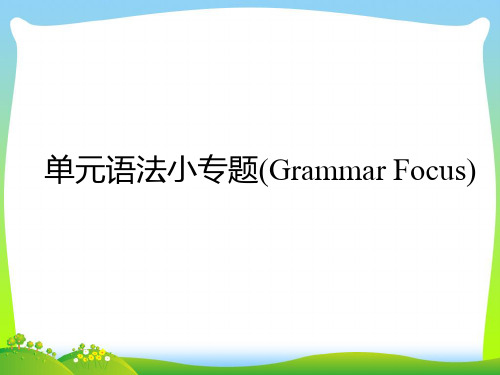
如: —Should these young trees be watered every day?应该每天给 这些小树浇水吗? —Yes,they should./ No,they shouldn‘t.对,应该。/不,不 应该。 (4)特殊疑问句结构为:疑问词+一般疑问句?如: What should students be allowed to do?应该允许学生们做什 么?
Ⅲ.根据汉语意思完成句子,每空一词。
16.更远的恒星有一天可能被参观。 Farther planets _m__a_y____ __b_e_____ __v_i_si_te_d__ one day.
17.你不应该在动物园里喂动物。 Animals __sh_o_u_l_d_n_'t____b_e___ __fe_d_____ by you in the zoo.
13、He who seize the right moment, is the right man.谁把握机遇,谁就心想事成。2021/7/212021/7/212021/7/212021/7/217/21/2021
• 14、谁要是自己还没有发展培养和教育好,他就不能发展培养和教育别人。2021年7月21日星期三2021/7/212021/7/212021/7/21
•
9、要学生做的事,教职员躬亲共做; 要学生 学的知 识,教 职员躬 亲共学 ;要学 生守的 规则, 教职员 躬亲共 守。2021/7/212021/7/21Wednesday, July 21, 2021
• 10、阅读一切好书如同和过去最杰出的人谈话。2021/7/212021/7/212021/7/217/21/2021 12:09:45 AM
(2)否定句结构为:主语+情态动词+not+be+及物动词的过 去分词+(by+宾语)Байду номын сангаас如:
人教版七年级英语上册:Unit4 单元语法小专题【练习】

单元语法小专题(Grammar Focus~3c),01语法精讲一、方位介词的用法英语中,当要表示某人或某物在某地时,通常要借助于方位介词。
方位介词不能单独充当句子成分,必须与其他词或短语构成介词短语放在be动词或其他动词后面作表语或状语等,也可放在名词后作定语。
下面我们来看一下本单元学到的三个方位介词。
1.on意为“在……上”,表示一个物体在另一个物体的表面上。
例如:The book is on the desk.那本书在书桌上。
2.in意为“在……里”,表示一个物体在另一个物体的内部。
例如:The dictionary is in the schoolbag.字典在书包里。
3.under意为“在……下”,表示一个物体在另一个物体的正下方,但两个物体并不接触。
例如:Is the baseball under the chair?棒球在椅子下面吗?二、where引导的特殊疑问句1.用法where是疑问副词,意为“在哪里;到哪里”,用来引导特殊疑问句。
常用句型“Where is+单数名词/代词?”或“Where are+复数名词/代词?”询问人或物所在的位置。
例如:Where is my eraser?我的橡皮在哪里?Where is she?她在哪儿?Where are the keys?钥匙在哪里?Where are they?他们在哪儿?2.答语(1)用It's…(对应Where is…?)或They're…(对应Where are…?)作答。
例如:—Where is my eraser?我的橡皮在哪里?—It's in your pencil box.它在你的铅笔盒里。
—Where are the keys?钥匙在哪里?—They're under the bed.它们在床下面。
(2)直接说出物品所在地点,省略it's或they're。
例如:—Where's the clock?时钟在哪里?—On the wall.在墙上。
人教版九年级英语第五单元
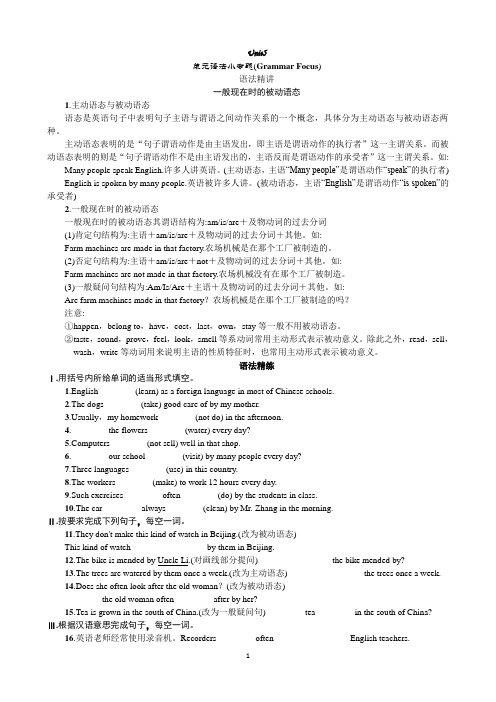
Unit5单元语法小专题(Grammar Focus)语法精讲一般现在时的被动语态1.主动语态与被动语态语态是英语句子中表明句子主语与谓语之间动作关系的一个概念,具体分为主动语态与被动语态两种。
主动语态表明的是“句子谓语动作是由主语发出,即主语是谓语动作的执行者”这一主谓关系。
而被动语态表明的则是“句子谓语动作不是由主语发出的,主语反而是谓语动作的承受者”这一主谓关系。
如: Many people speak English.许多人讲英语。
(主动语态,主语“Many people”是谓语动作“speak”的执行者) English is spoken by many people.英语被许多人讲。
(被动语态,主语“English”是谓语动作“is spoken”的承受者)2.一般现在时的被动语态一般现在时的被动语态其谓语结构为:am/is/are+及物动词的过去分词(1)肯定句结构为:主语+am/is/are+及物动词的过去分词+其他。
如:Farm machines are made in that factory.农场机械是在那个工厂被制造的。
(2)否定句结构为:主语+am/is/are+not+及物动词的过去分词+其他。
如:Farm machines are not made in that factory.农场机械没有在那个工厂被制造。
(3)一般疑问句结构为:Am/Is/Are+主语+及物动词的过去分词+其他。
如:Are farm machines made in that factory?农场机械是在那个工厂被制造的吗?注意:①happen,belong to,have,cost,last,own,stay等一般不用被动语态。
②taste,sound,prove,feel,look,smell等系动词常用主动形式表示被动意义。
除此之外,read,sell,wash,write等动词用来说明主语的性质特征时,也常用主动形式表示被动意义。
人教版九年级英语 习题 Unit 3 单元语法小专题
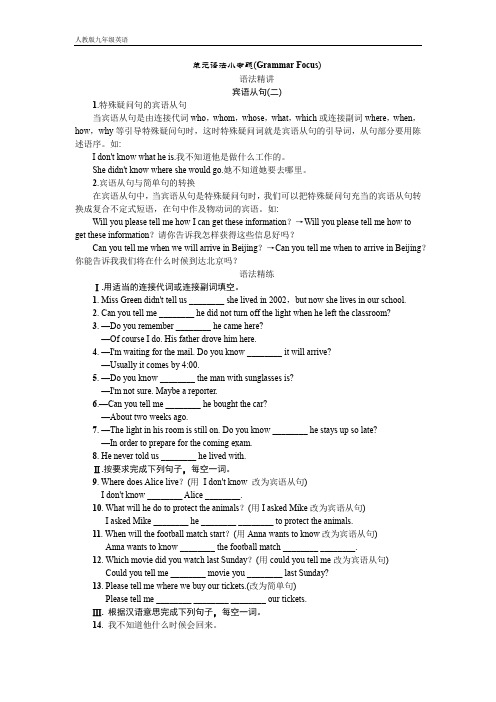
单元语法小专题(Grammar Focus)语法精讲宾语从句(二)1.特殊疑问句的宾语从句当宾语从句是由连接代词who,whom,whose,what,which或连接副词where,when,how,why等引导特殊疑问句时,这时特殊疑问词就是宾语从句的引导词,从句部分要用陈述语序。
如:I don't know what he is.我不知道他是做什么工作的。
She didn't know where she would go.她不知道她要去哪里。
2.宾语从句与简单句的转换在宾语从句中,当宾语从句是特殊疑问句时,我们可以把特殊疑问句充当的宾语从句转换成复合不定式短语,在句中作及物动词的宾语。
如:Will you please tell me how I can get these information?→Will you please tell me how toget these information?请你告诉我怎样获得这些信息好吗?Can you tell me when we will arrive in Beijing?→Can you tell me when to arrive in Beijing?你能告诉我我们将在什么时候到达北京吗?语法精练Ⅰ.用适当的连接代词或连接副词填空。
1. Miss Green didn't tell us ________ she lived in 2002,but now she lives in our school.2. Can you tell me ________ he did not turn off the light when he left the classroom?3. —Do you remember ________ he came here?—Of course I do. His father drove him here.4. —I'm waiting for the mail. Do you know ________ it will arrive?—Usually it comes by 4:00.5. —Do you know ________ the man with sunglasses is?—I'm not sure. Maybe a reporter.6.—Can you tell me ________ he bought the car?—About two weeks ago.7. —The light in his room is still on. Do you know ________ he stays up so late?—In order to prepare for the coming exam.8. He never told us ________ he lived with.Ⅱ.按要求完成下列句子,每空一词。
人教版七年级英语上册:Unit2 单元语法小专题【练习】
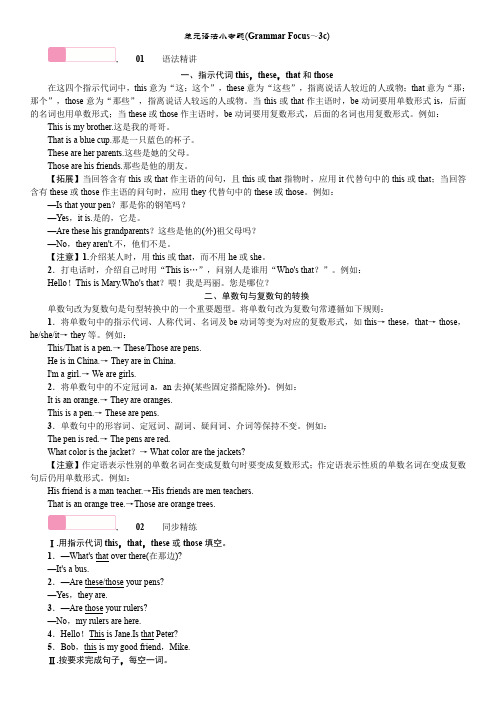
单元语法小专题(Grammar Focus~3c),01语法精讲一、指示代词this,these,that和those在这四个指示代词中,this意为“这;这个”,these意为“这些”,指离说话人较近的人或物;that意为“那;那个”,those意为“那些”,指离说话人较远的人或物。
当this或that作主语时,be动词要用单数形式is,后面的名词也用单数形式;当these或those作主语时,be动词要用复数形式,后面的名词也用复数形式。
例如:This is my brother.这是我的哥哥。
That is a blue cup.那是一只蓝色的杯子。
These are her parents.这些是她的父母。
Those are his friends.那些是他的朋友。
【拓展】当回答含有this或that作主语的问句,且this或that指物时,应用it代替句中的this或that;当回答含有these或those作主语的问句时,应用they代替句中的these或those。
例如:—Is that your pen?那是你的钢笔吗?—Yes,it is.是的,它是。
—Are these his grandparents?这些是他的(外)祖父母吗?—No,they aren't.不,他们不是。
【注意】1.介绍某人时,用this或that,而不用he或she。
2.打电话时,介绍自己时用“This is…”,问别人是谁用“Who's that?”。
例如:Hello!This is Mary.Who's that?喂!我是玛丽。
您是哪位?二、单数句与复数句的转换单数句改为复数句是句型转换中的一个重要题型。
将单数句改为复数句常遵循如下规则:1.将单数句中的指示代词、人称代词、名词及be动词等变为对应的复数形式,如this→ these,that→ those,he/she/it→ they等。
人教版(河北专版)九年级英语上册练习 Unit 1 单元语法小专题
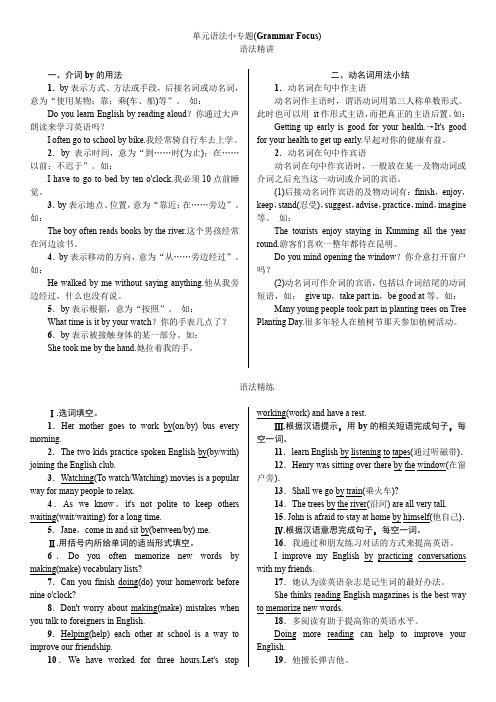
单元语法小专题(Grammar Focus)语法精讲一、介词by的用法1.by表示方式、方法或手段,后接名词或动名词,意为“使用某物;靠;乘(车、船)等”。
如:Do you learn English by reading aloud?你通过大声朗读来学习英语吗?I often go to school by bike.我经常骑自行车去上学。
2.by表示时间,意为“到……时(为止);在……以前;不迟于”。
如:I have to go to bed by ten o'clock.我必须10点前睡觉。
3.by表示地点、位置,意为“靠近;在……旁边”。
如:The boy often reads books by the river.这个男孩经常在河边读书。
4.by表示移动的方向,意为“从……旁边经过”。
如:He walked by me without saying anything.他从我旁边经过,什么也没有说。
5.by表示根据,意为“按照”。
如:What time is it by your watch?你的手表几点了?6.by表示被接触身体的某一部分。
如:She took me by the hand.她拉着我的手。
二、动名词用法小结1.动名词在句中作主语动名词作主语时,谓语动词用第三人称单数形式。
此时也可以用it作形式主语,而把真正的主语后置。
如:Getting up early is good for your health.→It's good for your health to get up early.早起对你的健康有益。
2.动名词在句中作宾语动名词在句中作宾语时,一般放在某一及物动词或介词之后充当这一动词或介词的宾语。
(1)后接动名词作宾语的及物动词有:finish,enjoy,keep,stand(忍受),suggest,advise,practice,mind,imagine 等。
- 1、下载文档前请自行甄别文档内容的完整性,平台不提供额外的编辑、内容补充、找答案等附加服务。
- 2、"仅部分预览"的文档,不可在线预览部分如存在完整性等问题,可反馈申请退款(可完整预览的文档不适用该条件!)。
- 3、如文档侵犯您的权益,请联系客服反馈,我们会尽快为您处理(人工客服工作时间:9:00-18:30)。
单元语法刀、专题(Grammar Focus)
语法精讲
复合不定代词
不指明代替任何特定名词或形容词的代词叫做不定代词,如:some, any, much, many, both, few等。
本单元主要学习some, any, every, no加上thing或one构成的复合不定代词的含义及其用法。
复合不
定代词
含义用法例句
thing something 某事;某物肯定句I'd like something to eat. anything
某事;某物否定句及疑问句
Did you buy anything in the
store?
任何东西 (事物)
肯定句
You can take anything you
like—
everything 一切
肯定句、疑问句及
否定句
Don't worry.Evcrything
isOK—
nothing
没有
什么
用于否定句中,相
当于not anything
Mr.Smith sai —d nothing
then.
one
复合不
定代词
含义用法例句someone 某人肯定句Listen! Someone is singing.
anyone
某人
否定句和疑
问句Tom doesn't want to help anyone.
任何人
肯定句Anyone can do that.
everyone
人人;
大家
肯定句、否定
句及疑问句
Everyone doesn't like this movie.
no one
没有
人
否定句No one went to the mountains yesterday. 【温馨提示】
(1)复合不定代词作主语时,谓语动词常用单数形式。
如:
Everyone in the village is friendly.这个村子里的每个人都是友好的。
(2)复合不定代词若有定语(形容词或动词不定式)修饰时,定语要放在其后。
如:
Let's do something interesting.让我们做一些有趣的事。
I'd like something to drink.我想要一些喝的东西。
(3)在表示请求、建议等的疑问句中,问话者希望得到肯定答复时,常用含有some的不
定代词。
如:
Would you like something to eat?你想要一些吃的东西吗?
语法精练
1.用方框中所给的单词填空。
everyone, anything, nothing, something, anyone, everything
1.The ---- re isn't new in the whi — te box.
2.Tina is doing well in the ne ---- w school.There's to ― worry about.
3.Did you go to the farm with?
4.一._ in the room looks very tidy and clean.
e here! I have important to tell you.
6.一an you cook eggs with tomatoes?
—Yes, sure.can do it, because it is easy, I think ---------------------
II .从括号内选择正确的单词完成句子。
7.There(isn't/aren't) anything interesting in the book.
8.No one(were/was ----------------- ) in front of the house.
9.一Did your cousin buy(nothing/anything) in the supermarket?
10.Mar 一y didn't go to the post office with (anyone/someone) last Sunday morning. 11- The singer is ver一y great.Everyone here(know/knows) her.
in.按要求完成下列句子,每空一词。
12.There is something interesting in the story.(改为否定句)
There interesting in the story.
There interesting in the story.
13.Someone is reading in the classroom.(改为一般疑问旬)
reading in the classroom?
14.我妈妈不知道关于这件事的任何情况,因为没有人告诉她。
(汉译英)
My mother knows about it because told her.
单元语法小专题(Grammar Focus)
I. 1 .anything 2 ------ nothing 3.anyone 4.Evcrything 5-something
6. Everyone
II・7・isn't 8.was 9.anything 10.anyone 11 .knows
III. 12.isn't anything; is nothing 13.Is anyone 14.nothing; no one。
